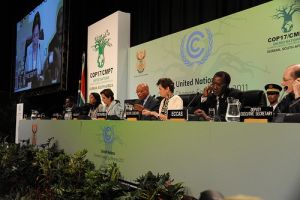The second and final week of the UN climate negotiations in Durban, South Africa is now underway. Canada's priorities in the talks are captured pretty well by the following quote from Minister Kent:
Our fixation, our commitment is on Copenhagen and the Cancun agreement. We believe that ultimately a new agreement that includes all of the world's major emitters in both the developing and the developed world is the only way to materially reduce annual megatonnage to the point that we can work to prevent global warming hitting or exceeding two ... degrees.
On the surface, this sounds like a pretty reasonable fixation to have. We should all want a global agreement that gets us on track to avoiding the worst-case climate change scenarios. But to what extent do Canada's actions actually contribute to meeting this goal? In our view, a wealthy country such as Canada that is serious about reaching such an agreement, would be doing three things:
- Taking action at home to ensure the country is on track to meet its own climate commitments;
- Helping to make progress on the financing needed to support climate action in developing countries;
- Seeking solutions to close the ambition gap between the nation-by-nation pledges and the agreed upon objective of avoiding 2˚C or more of warming.
Let's take a look at where Canada stands on these points. Based on comments from representatives of other countries (including delegates from South Africa and other African nations), it's clear that many leaders don't see Canada as stacking up very well. A new global climate performance assessment released today, ranking Canada in 54th place out of 61 spots internationally, suggests not all of the criticism leveled at Canada is overblown.
Credible actions to reduce emissions at home
In order to have credibility in any negotiation, others must believe that you will actually keep your word. The climate talks are no different: countries expect to see evidence that we stand behind the commitments we have made. Canada's complete disregard for our Kyoto commitments means that the credibility gap we face on our current commitments is understandably wider than for most.
Regrettably, we don't seem to have learned from the lessons Kyoto is offering us. Two years after committing to our current target in Copenhagen, Environment Canada's projections show that Canada's current federal and provincial policies will achieve only a quarter of the reductions needed by 2020- leaving 75 per cent of the work as a question mark is not exactly a big trust-builder!
Financing to support developing countries
In Cancun, developed countries affirmed two main commitments related to climate financing that were initially agreed to in Copenhagen:
- An amount "approaching" US$30 billion in "new and additional resources" from 2010 to 2012, "with a balanced allocation between adaptation and mitigation."
- A goal of "mobilizing jointly USD 100 billion dollars a year by 2020, "with the funding coming from a variety of sources (including "alternative" sources).
 These commitments are important because without them, developing countries will not have the resources needed to reduce their emissions or adapt to the climate-related changes that are already happening.
These commitments are important because without them, developing countries will not have the resources needed to reduce their emissions or adapt to the climate-related changes that are already happening.
Canada has committed to provide $1.2 billion over 2010 to 2012, which reflects a fair share of the $30 billion total. A June 2010 announcement followed through on the first $400 million and, while there was certainly room for improving the ways in which that money was being provided, it was generally seen as a positive step. The government has reiterated its commitment to the $1.2 billion over three years but has not provided the details that would be needed to assess the contribution in 2011 and 2012.
Canada could also be playing a leadership role on longer-term financing. Specifically, by pushing for a prompt start to the Green Climate Fund and supporting continued climate finance contributions beyond 2012, scaling up to meet the $100 billion goal by 2020. Instead, Canada has joined the U.S. in flagging concerns about the Green Climate Fund, which could delay its launch in Durban, and has not put forward or supported any constructive proposals for scaling up climate finance after 2012.
Solutions to close the ambition gap
Many organizations, including the International Energy Agency, the OECD, and the UN Environment Program, have warned recently that there is a major gap between the 2˚C goal and the pathway set by current pledges under the Copenhagen/Cancun agreements. Existing commitments (assuming they're all met) deliver only half of the reductions needed to get on a 2˚C pathway by 2020, and risk locking us into a dangerously warmer world well beyond the limit.
Strong supporters of the Copenhagen/Cancun agreements, like Canada, must demonstrate how countries can collectively increase their ambitions to the levels needed to meet the 2˚C goal. But instead of setting a stronger target or laying out a plan to meet our current one and take bolder steps afterwards, Canada has adopted a take-it-or-leave-it approach. We have not offered to take more ambitious action if others do the same. Nor has Canada proposed any means by which parties can work together to scale up their ambition or close loopholes to bring us closer to the maintaining the 2˚C goal.
Is Canada's "fixation" on a new global climate deal just talk?
Central to bridging differences and bringing countries together into a new agreement is the need for flexibility and creativity. It's no coincidence that the countries bringing these attributes to the talks are the ones finding the compromises necessary to move forward. Canada's hard and inflexible positions (such as on the extension of the Kyoto Protocol and elsewhere) have made little contribution to this effort in Durban, leaving our country watching from the sidelines. The positive steps on short-term financing do not make up these weaknesses in our negotiating positions, or for the lack of progress on actions in Canada.
Saying we're fixated on a global agreement that will limit warming to 2˚C or less is a good end-point to be striving towards. But if Canada's actions continue to create roadblocks towards our professed objective, it's hard to take those words with any more than a grain of salt.
Let's hope that with some extra flexibility, and a whole lot more ambition, Canada can make a positive contribution this week.






